Promotional Feature with Dengie Performance Fibres
Whatever level you compete at, and no matter how hard you are working your horse, fibre should be the foundation of the ration. Not only is fibre pivotal for digestive health, but it also provides a whole host of nutrients.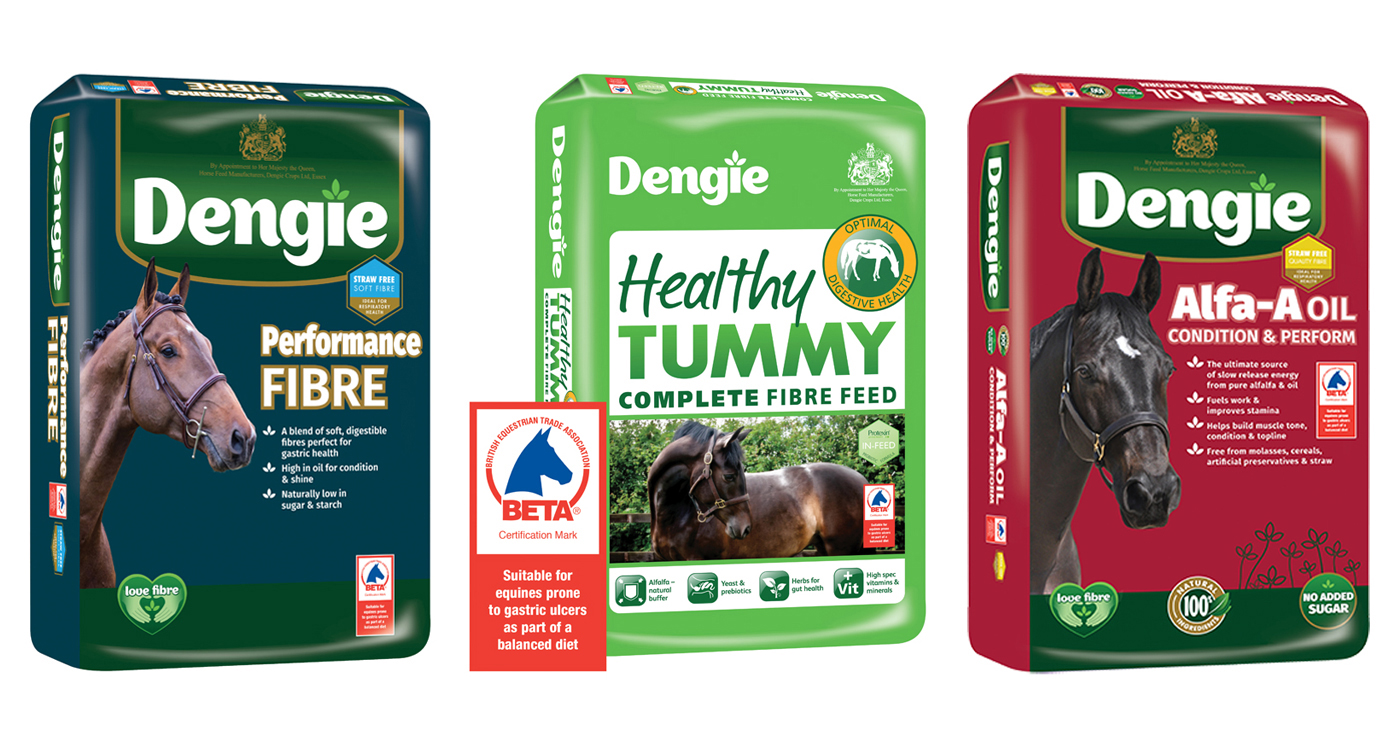
Here Dengie provides just some of the reasons why you should be thinking fibre first in your horse’s bucket feed – you just need to pick the right fibre feed for your horse!
Fibre for Energy
Often undervalued, fibre can provide a significant amount of energy for the working horse. The amount of energy supplied depends on the digestibility of the fibre source, which is influenced by plant type, environmental conditions and, most significantly, maturity at harvest. The more mature a plant, the less digestible it will be and therefore the less energy it will provide. Straw is a particularly low energy fibre for this reason making it fantastic for good do-ers, but not as useful for the performance horse that has a higher energy requirement.

Dengie’s Performance Fibre – a blend of nutrient rich, high temperature dried alfalfa and grass with a light addition of molasses and spearmint oil to encourage fussy feeders.
Dengie Alfa-A Oil combines pure alfalfa with a rapeseed oil coating. Providing 12.5MJ/kg digestible energy, Alfa-A Oil provides as much energy as a competition mix/cube, but without the starch. Based on entirely slow-release energy sources, Alfa-A Oil is particularly useful for stamina and condition without the fizz, which are fundamental to the performance horse, regardless of discipline.
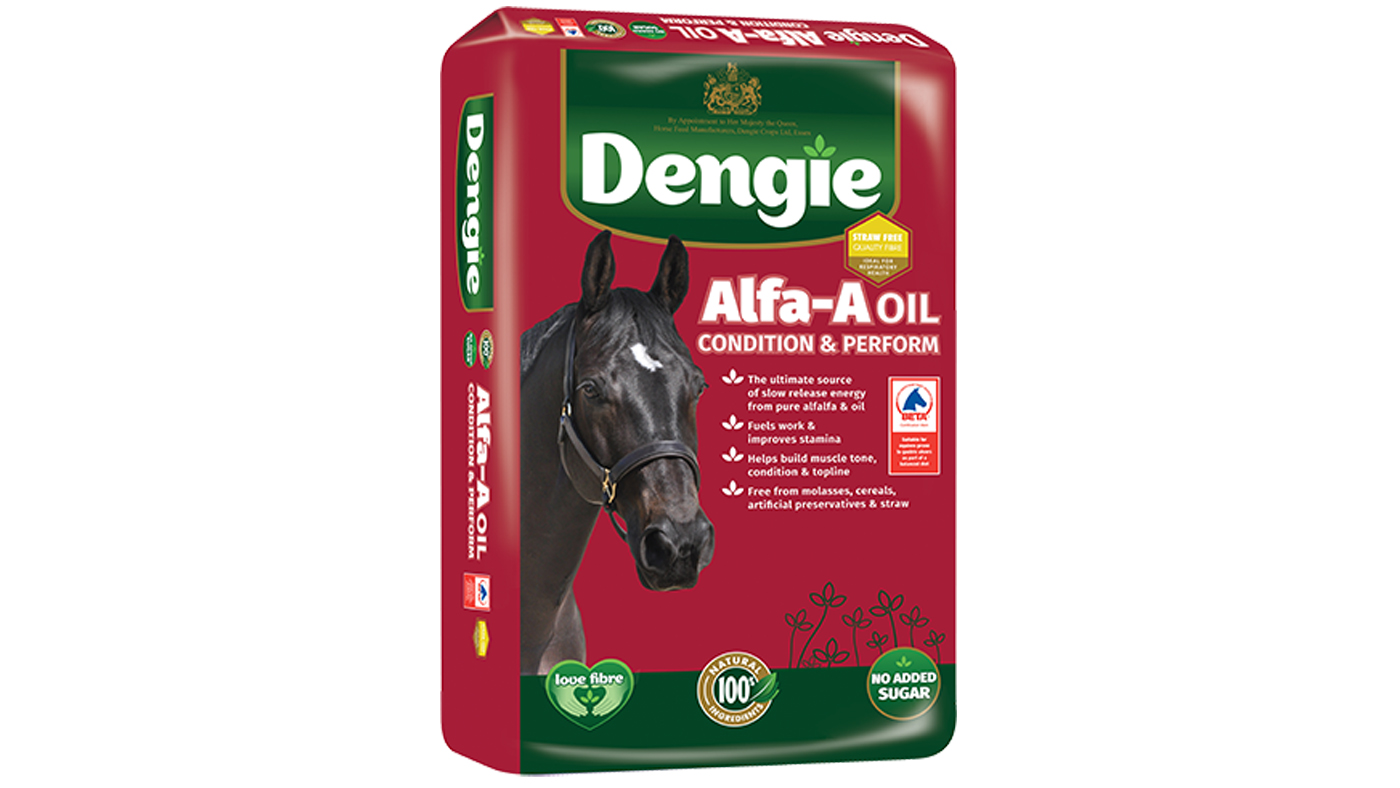 Fibre for Digestive Health
Fibre for Digestive Health
It is well documented that fibre is vital for the digestive health of the horse. Low fibre diets, combined with higher starch rations are linked to loose droppings, an increased risk of colic and gastric ulcers. When it comes to ulcers not all fibre is the same and research has shown that alfalfa as a fibre source is a superior buffer to acidity in the digestive tract1,2. Feeding a double handful of a chopped alfalfa-based fibre feed in the 20-25 minutes before you ride is recommended to help prevent ‘acid splash’ in the non-glandular region of your horse’s stomach. The fibre makes sure the stomach isn’t empty and suppresses the movement of the acidic contents when the horse moves.
Dengie Healthy Tummy combines chopped and pelleted alfalfa with a rapeseed oil coating, added herbs, vitamins and minerals, and ADM Protexin In-Feed formula which provides live yeast and a prebiotic. When fed at the recommended quantity, no additional vitamins and minerals are required for horses working up to a moderate level.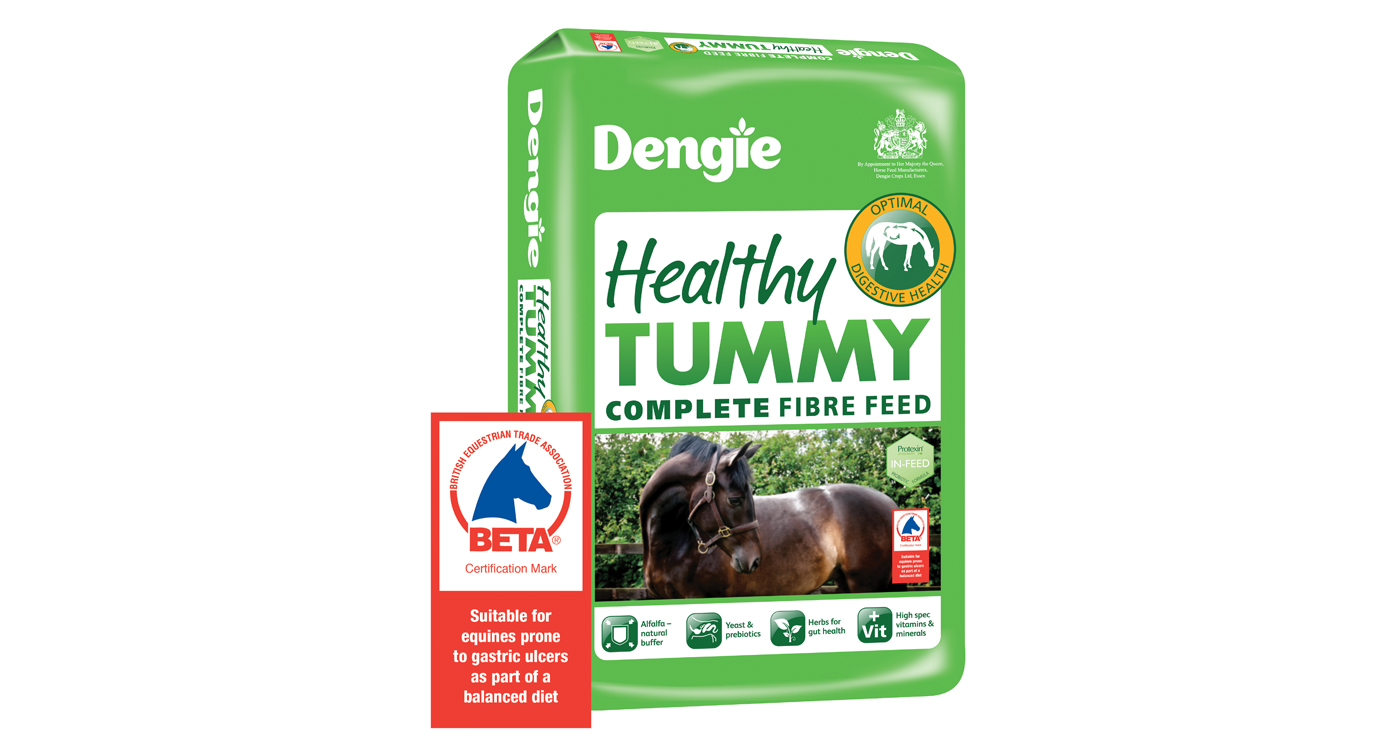
Fibre and Respiratory Health
Stabling and travelling horses in confined spaces potentially increases their exposure to respirable particles, which can be detrimental to respiratory health. Respirable particles include mould, among other things, and even hay and straw that look and smell ok to us can still contain a significant mould count and have the potential to do harm.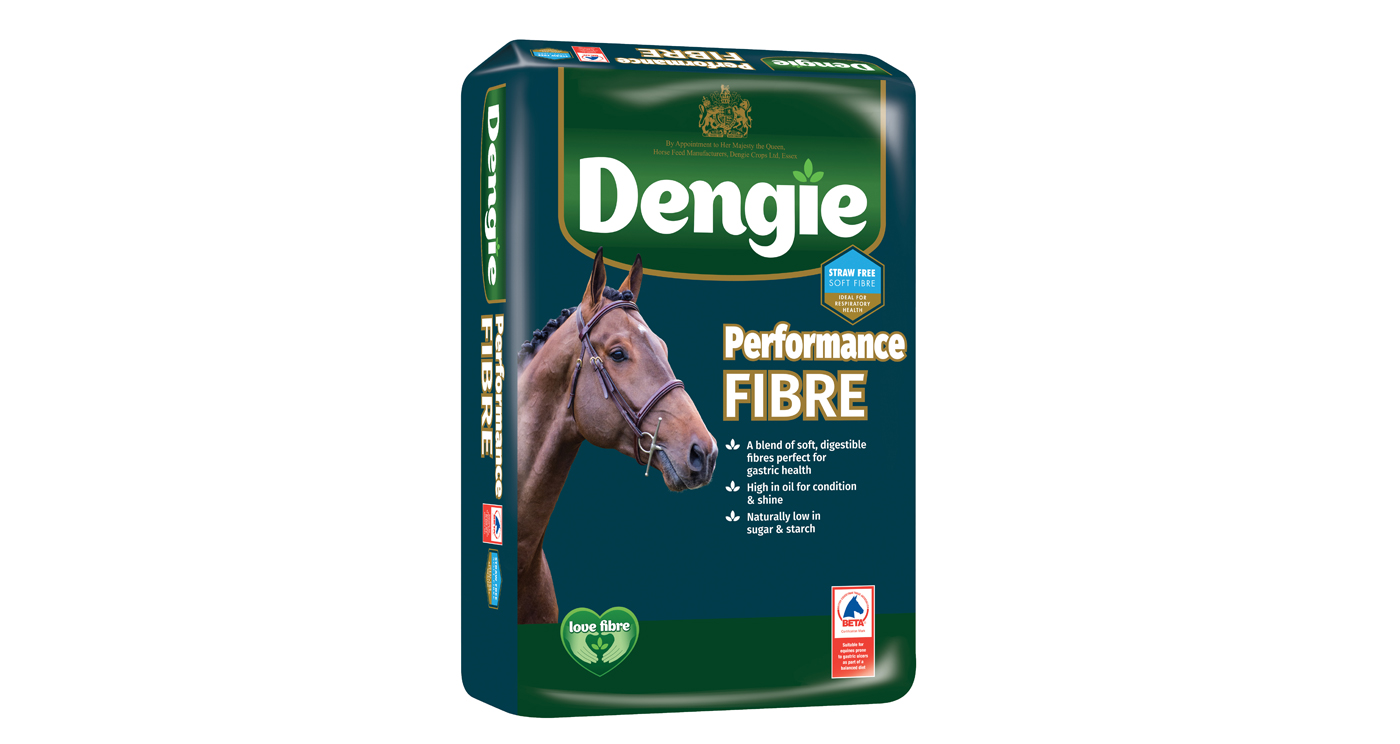
Dengie Performance Fibre combines high temperature dried grasses and alfalfa with a light molasses and oil coating with added spearmint oil. As both the grasses and alfalfa are high temperature dried, Performance Fibre provides an exceptionally clean fibre source for the performance horse and can also be used as a partial forage replacer. Performance Fibre is a highly palatable fibre feed which is really useful for helping to tempt the fussy feeder which can be a particular problem in the fit horse, regularly travelling away from home.

Graham Babes ensures that Alfa-A Oil is always in the bucket, at home and when competing abroad.
Fibre to Supply Protein
Everyone knows that protein is vital for growth, renewal and repair. When it comes to the dressage horse this translates to strength and top line muscle condition. It is important to understand that nutrition isn’t the only piece of the puzzle and you will also need to focus on fitness and training to build your horse’s strength.
Having sufficient protein in the diet is important for building muscle and it’s not just the amount of protein, but the quality as well, that matters. Protein is made up of building blocks called amino acids. Some of these must come from the diet and these are called essential amino acids and described as “quality” protein. Of these, lysine is particularly important as it is a limiting amino acid – if the horse has insufficient lysine then protein synthesis and therefore muscle development would be limited.

Alfa-A Original is fed to all of Alice Oppenheimer’s dressage horses from the youngsters to Grand Prix.
Your horse will obtain protein from a variety of sources in the diet including grass, forage and the bucket feed. Some ingredients such as alfalfa are particularly abundant sources of protein. Alfalfa typically supplies 1.8x more lysine than average hay making it a valuable addition to the ration to help promote muscle development. All of Dengie’s Alfa-A range of fibre feeds are based on pure alfalfa and up to 500g per 100kg bodyweight can be fed daily.
Fibre to Aid Hydration
Hydration is key for health and performance. Both water and electrolytes are required to keep your horse hydrated and an electrolyte supplement should be a daily addition to the ration throughout training, travel and competition. Using a fibre mash such as Dengie Alfa-Beet, which combines alfalfa and unmolassed sugar beet, can be helpful for two reasons. Firstly, as a soaked feed, Alfa-Beet carries water into the digestive tract and, as it is so highly digestible, releases it readily to aid hydration. Secondly, as Alfa-Beet is a very palatable fibre mash it is useful for masking the taste of electrolytes or water when travelling and competing away from home.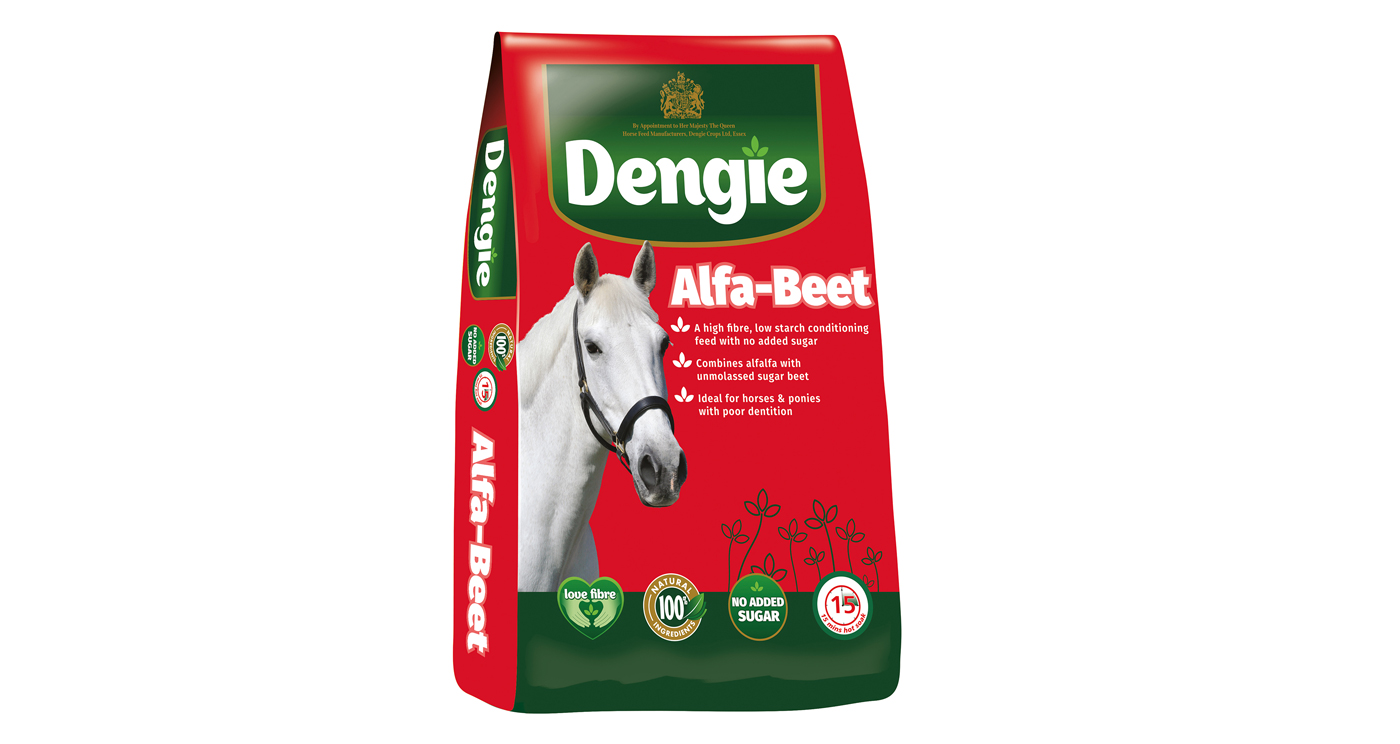
For feeding advice contact the Dengie Feedline on 01621 841188 or visit www.dengie.com and click here to complete our Feed Advice Form. 
References:
1. Nadeau et al (2000) Evaluation of diet as a cause of gastric ulcers in horses American Journal of Veterinary Research, 2000, July 61 (7): 784-90.
2. Lybbert, T., Gibbs, P., Cohen, N., Scott, B. and Sigler, D. (2007) Feeding alfalfa hay to exercising horses reduces the severity of gastric squamous mucosal ulceration. Proc. Am. Ass. Equine Practnrs. 53, 525-526



